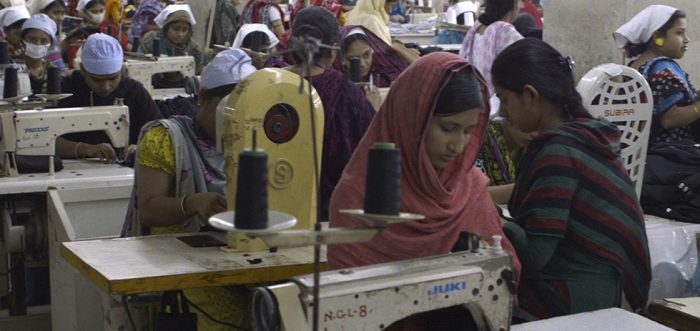
The True Cost is a documentary about the impact of the fashion industry on the human rights and the environment. Directed by Andrew Morgan and produced by Michael Ross, it features a range of interviews with the more ecologically-aware members of the fashion industry, as well as with economists, organic cotton farmers and those who work in the sweat shops of Bangladesh and India. The interviews are spliced together with news footage related to consumerism and the effects it has had on developing nations. There is particular focus on the Rana Plaza disaster: in 2013, an eight story building in Bangladesh, staffed by thousands of garment workers, collapsed due to long-standing structural problems. 1, 130 people died. This occurred even though the workers were well aware of the buildings problems and had complained multiple times to management.
From the documentary’s beginning, we are confronted with the fact that the fashion industry has evolved from making four seasons a year, to a model based on fast fashion where companies such as Zara, Forever 21 and H&M, churn out new clothes every single week, clothes that are so cheap that people buy them, wear them once, and throw them out. In this way the clothes that we wear, Morgan argues, have been transformed from being seen as something we invest in and wear over and over again, to something disposable. Moreover, Morgan convincingly argues, these companies are able to profit off a systemic violation of human rights. The Rana Plaza disaster, for instance, would never have happened if garment factories in Bangladesh were not incentivised by the global market system to cut costs at the expense of protecting basic human rights.
The True Cost is a timely documentary. Earlier this year, actress Emma Watson made headlines wearing a dress made out of recycled materials to the Met Gala in New York. Her dress was made out of fabrics woven from recycled plastic bottles. She tweeted “#30Wears” – a reference to the campaign launched by Livia Firth, one of the executive producers of The True Cost, that asks people to wear every item of clothing at least 30 times. (The idea is that until consumers start to pay more for better quality clothing brands, the fast fashion industry will continue to proliferate.) The True Cost has been released at a time when consumers have started to pay attention to the effects of fashion on the environment, such that many audience members are sure to find it compelling.
The True Cost is a decent documentary, but simultaneously a flawed one. Certainly, it tells an important message and expertly renders the effects of the fast fashion more immediate and human. We spend a lot of time with Shima, for example, the 23 year old garment factory worker who learns less than 3 US dollars a day. Learning about how she had to give away her child, and about how her efforts at unionisation were punished with violence, it is impossible to not empathise with the plight of the garment factory worker. The montage towards the end of the film, which contrasts scenes of waste and the appalling working conditions in developing countries, with the frenzy of the Black Friday sales at Macy, is especially touching.
However, at one and a half hours, The True Cost is far too long for the amount of content it has. By the end of the film, it started to get repetitive. We see the fashion industry criticised by all sorts of different people, from designers, such as Stella McCartney, to economists. We are told over and over again that there is something wrong with the design of the system. What The True Cost fails to deliver is any allusion to how the system may be fixed. There is the hint that consumers could do their part by refusing to buy from the implicated brands, and yet there is no discussion about what could be done at a political level to fix the problem. By the end of the film, all that is obvious is that multimillion-dollar corporations profit off a systemic violation of human rights in countries with less strict labour laws. Most viewers will find this revelation quite obvious. Perhaps we had not considered it applying to the fashion industry in particular, but these sorts of violations are sadly rife in the globalised economy we inhabit today.
